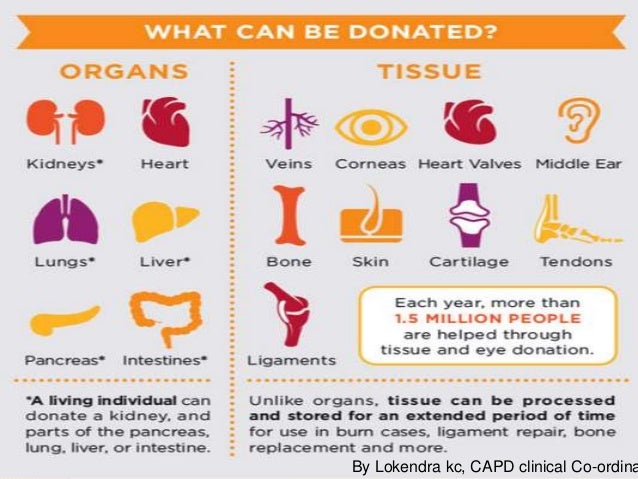Can I donate all of my organs before death?
Organs That Can Be Donated While Alive. You may be able to donate: One of your kidneys. A kidney is the most common donation. Your remaining kidney removes waste from the body. One liver lobe. Cells in the remaining lobe grow or refresh until your liver is almost its original size.
What organs can you donate without dying?
Most often, you donate organs once you’ve died. You can donate some organs while you’re alive. What organs can I donate after I die? Kidneys (2) Liver; Lungs (2) Heart; Pancreas; Intestines; Hands and Face; Get answers to your questions about donating after death. What organs can I donate while I’m alive? One kidney; One lung; A part of the liver
What are the most common organs to donate?
Jun 13, 2019 · About four out of every ten donations are living donations. The most frequently donated organ from a living donor is a kidney. A healthy person has two kidneys and can continue to live an active life with just one. Kidney donors must be the same blood type and be a similar size and weight of the recipient.
Which organs and tissues can be donated after death?
Apr 28, 2021 · Healthy people can do just fine with a single kidney. And after a piece of the liver is removed, the organ will regenerate itself — in both the donor and the recipient — within six to 12 weeks, says Dr. Kiran Bambha, a transplant hepatologist and medical director for the UW Living Donor Liver Transplant Program.

What organs can you donate while alive for money?
Organs That Can Be Donated While AliveOne of your kidneys. A kidney is the most common donation. ... One liver lobe. Cells in the remaining lobe grow or refresh until your liver is almost its original size. ... A lung or part of a lung, part of the pancreas, or part of the intestines. These organs don't regrow.Apr 20, 2021
Can you donate your organs while still alive?
You may donate an organ/tissue such as a kidney or part of the liver to a person who needs it while you are alive.
Can I donate my heart while still alive?
The heart must be donated by someone who is brain-dead but is still on life support. The donor heart must be in normal condition without disease and must be matched as closely as possible to your blood and /or tissue type to reduce the chance that your body will reject it.Apr 24, 2021
What organ can you live without and donate?
There are many organs one can theoretically do without, or for which there's a backup. Most folks can spare a kidney, a portion of their liver, a lung, some intestines, and an eyeball, and still live a long life.Aug 29, 2013
Can we donate eyes after death?
Eyes can be donated only after death. Eyes must be removed within 4 - 6 hours after death. Eyes can be removed by a registered medical practitioner only.
What organ is in the highest demand?
KidneysKidneys are the organs in most demand across the country according to the United States Department of Health and Human Services. The next highest need in Illinois is the more than 300 people waiting for liver transplants.
Can I sell my pee for money?
The Payout. The going rate appears to be about $20 per ounce — and possibly jail time. Whether it's a tiny condo in a bad part of town or a bag of someone else's urine, if there's enough demand for something, it will become valuable.Oct 28, 2014
Can you donate your skin?
Anyone can be a donor irrespective of sex & blood group. The minimum age of the donor should be 18 years but there is no upper age limit. Even a 100-year-old person can donate his skin and it will be used for treatment.Nov 13, 2015
What is deceased organ donation?
Deceased Organ Donation: When we talk about pledging your organs for donation or about organ donation after death, we are talking about Deceased Organ Donation. This is an organ donation from a person who has been declared brain stem dead by a team of authorized doctors at a hospital.
Can you donate your uterus?
Can women donate their uterus? Yes, a uterus can be donated from either a living or deceased donor. A living uterus donor gives her uterus for the purpose of transplantation to a female recipient.
How many lives can you save by giving organs?
The list of organs and tissues that you can donate continues to grow. You can save up to eight lives and improve over 75 more. Most often, you donate organs once you’ve died. You can donate some organs while you’re alive.
How long after death can you donate corneas?
Doctors can remove and store corneas several hours after death. They can do the corneal transplant three to five days after donation. . Donated tissues enhance the quality of life for the people who receive them.
Why do corneas get damaged?
Damaged corneas can result from eye disease, injury, or birth defects. More than 97% of all corneal transplants restore the receiving patient’s vision. Corneal donors don't have to "match" receiving patients like organ donors do. Donors are universal. Age, eye color, and the quality of your eyesight don’t matter.
What tissue is used to make blood cells?
Bone marrow: This soft tissue is inside your bones. It produces many blood cells. Doctors remove it to get stem cells. Cord blood stem cells: The blood in the cord that connects a newborn to the mother during pregnancy has high levels of blood stem cells. Doctors can collect and store these in freezers for a long time.
When can I donate stem cells?
If you’re healthy and between age 18 and 60, you can donate blood stem cells. It’s best when the donor and the receiving patient’s tissue type or human leukocyte antigen (HLA) match. It’s easier to find a match in the same family or in the same racial or ethnic group.
Can you donate corneas?
You can donate your cornea when you sign up as an organ, eye, and tissue donor. This lets you leave behind the gift of sight. In 2018, doctors performed over 85,000 corneal transplants. The cornea is the clear part of the eye over the iris and pupil. Damaged corneas can result from eye disease, injury, or birth defects.
How many people are waiting for organ transplants?
Every 10 minutes another name is added to the list of more than 113,000 people currently waiting for an organ transplant in the United States. The names on the list include infants, toddlers, teens, parents and grandparents who all need an incredible gift in order to live.
How old do you have to be to donate a kidney?
A living donor needs to be between the ages of 18 and 60 and in good health. Care is given to be sure there will be no adverse physical, psychological or emotional issues with the donation. The transplant center evaluates a donor to determine emotional fitness, physical health, and compatibility.
How long can a kidney be preserved?
Kidney donors must be the same blood type and be a similar size and weight of the recipient. A kidney can be preserved outside of the body for up to 36 hours making it easy to transport if necessary.
Can you donate organs while you are alive?
Although most organ and tissue donations occur after the donor has died, there are some organs and tissues that can be donated while the donor is alive. About four out of every ten donations are living donations. The most frequently donated organ from a living donor is a kidney. A healthy person has two kidneys and can continue to live an active ...
Is Gift of Hope a non profit organization?
Gift of Hope is a not-for-profit organ procurement organization that is dedicated to arranging organ and tissue donation for the 12 million people who live in Illinois and northwest Indiana. This region is one of the busiest in the nation with 9 transplant centers that offer 34 transplant programs.
How many lives can an organ donor save?
An organ donor may be able to save up to eight lives after his or her passing. The organs typically received from a donor include: Transplanted tissue cannot only drastically improve someone’s ability to function; it can also mean the difference between life and death. Tissues that can be donated include: The gift of these tissues as ...
How to learn about organ donation?
One of the best ways to learn about and promote organ donation is by talking to your family about it. After your passing, your body will then become the lifeline for several people waiting for transplants. Multiple people suffering through a variety of ailments such as diseases or trauma can be saved through your donation.
What are the different types of tissue?
Transplanted tissue cannot only drastically improve someone’s ability to function; it can also mean the difference between life and death. Tissues that can be donated include: 1 Corneas (the part of the eye in front of the iris) 2 Bones 3 Skin 4 Veins 5 Heart Valves 6 Ligaments 7 Tendons

Popular Posts:
- 1. where to donate live rooster phoenix
- 2. what charity should i donate clothes to
- 3. where to donate sports equipment near me
- 4. how to donate air miles
- 5. how to donate to federal workers in san diego
- 6. how many people donate to aspca
- 7. where to donate bras near me
- 8. how much do you get if you donate plasma
- 9. where to donate used eyeglasses near me
- 10. why cant i run after i donate